|
|
|
Sort Order |
|
|
|
Items / Page
|
|
|
|
|
|
|
| Srl | Item |
| 1 |
ID:
140768
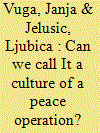

|
|
|
|
|
| Summary/Abstract |
The following article does not discuss various aspects of international cooperation on the political and strategic levels but considers the challenge of cross-cultural cooperation among service members in the field. Cooperation in a culturally diverse environment is influenced by various cultures and identifications (the national culture, military organizational culture, social identities). Based on the presumption that the culture is manifested through the values, rituals, symbols, practices, and language, the thesis about the existence of peace operations’ culture was tested. The main research questions were: (a) how are national and military cultures manifested in a peace operation?; (b) does the culture of a peace operation exist?; and (c) do service members of various nationalities identify themselves with a peace operation? The study was conducted among Italian and Slovenian service members deployed to at least one peace operation. The results show that a peace operation develops practices, values, symbols, rituals, and a common language. Hence we can speak of a peace operation’s culture. The service members’ identification with the peace operation is strong during the deployment; however, sources of identification vary depending on one’s position in the peace operation (i.e., national unit, multi-national HQ). Service members in HQs develop a strong sense of belonging to the multi-national working team, while the main source of common identity for bigger national units is the local environment.
|
|
|
|
|
|
|
|
|
|
|
|
|
|
|
|
| 2 |
ID:
100024
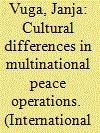

|
|
|
|
|
| Publication |
2010.
|
| Summary/Abstract |
The article is based on research conducted at the Defence Research Centre, emphasizing the qualitative data gathering conducted among members of the Slovenian Armed Forces (SAF) in the UN Interim Force in Lebanon (UNIFIL II) mission in 2007-09. Complex peace operations, as opposed to traditional ones, require a multinational structure and cooperation with several non-military actors/subjects. Trying to be effective, doing the job as well as possible and surviving the situation of living in a limited area with formal and informal interaction with a small number of people takes well-defined rules and procedures as well as the awareness of the importance of integrating mechanisms. Culture, encompassing the military organizational culture as well as the so-called 'national culture', undeniably has a substantial impact on the relations within a given multinational operation. Within the cultural framework, the common language or lingua franca deserves special attention.
|
|
|
|
|
|
|
|
|
|
|
|
|
|
|
|
| 3 |
ID:
137553
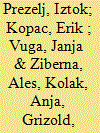

|
|
|
|
|
| Summary/Abstract |
The military transformation process typically focuses on the structural, operational, technical, personnel, training, and similar dimensions. Yet conceptual and practical approaches to such transformation have largely neglected the importance of the perceptional and subjective aspects that have frequently negatively affected this process. This article fills this gap by developing the Input-Process-Output Transformation Model and testing it on a sample of 55 military transformation experts from 23 NATO and PfP countries. The results highlight what are perceived to be the most important variables affecting the transformation input, process, and output that need to be incorporated in future integrated transformation strategies. It also turns out that transformation strategies need to increase the involvement of civil society, improve public support, the level of internal understanding of transformation goals, and the level of experimentation.
|
|
|
|
|
|
|
|
|
|
|
|
|
|
|
|
| 4 |
ID:
137629
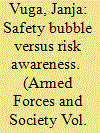

|
|
|
|
|
| Summary/Abstract |
The acceptance of risk in a certain society is tested when de facto or merely potential military death casualties are raised. Several dimensions influencing the acceptability of risk have already been analyzed, although only three are examined in this article—namely, the historicopolitical, sociodemographic, and cultural. The Slovenian public opinion survey persistently shows strong risk aversion among Slovenians and the article’s purpose is therefore to (1) establish how can the strong risk aversion be explained by the selected dimensions; and (2) identify what part of the population is most risk-aversive. To that end, over twenty years of Slovenian public poll data are analyzed using a triangulation of statistical methods, revealing a cultural pattern of safety bubble versus risk awareness. As the risk aversion model reveals, Slovenian society represents a safety bubble, with strong risk aversion and a very narrow selection of activities worth making sacrifices for. Death casualties are rarely accepted, even if incurred in support of ideals society strongly appreciates, like humanitarian causes.
|
|
|
|
|
|
|
|
|
|
|
|
|
|
|
|
| 5 |
ID:
135922
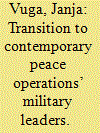

|
|
|
|
|
| Summary/Abstract |
Contemporary military organizations have undergone important changes in terms of values (converging with civilians) and expected performance (diverging from traditional tasks) in multi-national environments. Military leaders were the first to adapt to the changes, since they represent the core of the military profession. This article identifies professional skills and personal characteristics of contemporary military leaders, based on cross-national perceptions of Italian and Slovenian service members. A triangulation of qualitative and quantitative methods reveals that: (1) the military organizational culture is the most important factor supporting multi-national leadership and (2) unlike traditional military leadership, which emphasizes traditional military values and skills, post-modern leadership assigns more importance to emotional and cultural intelligence. Both key findings indicate a cultural gap between the traditional masculine, hierarchical and the flexible, culturally open military organization
|
|
|
|
|
|
|
|
|
|
|
|
|
|
|
|
| 6 |
ID:
101817
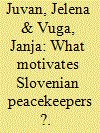

|
|
|
|
|
| Publication |
2011.
|
| Summary/Abstract |
This article is based on the results of longitudinal research on the motivations and expectations of members of the Slovenian Armed Forces participating in peace operations from 2003 to 2009. The analysis is based on three main approaches. The first is to distinguish between two groups of soldiers: those deployed to missions abroad on a voluntary basis, and those deployed to missions by order. The second approach is to distinguish between those deployed for the first time, and those who have already participated in peace support operations (PSOs) before. The third approach aims at distinguishing between three types of soldiers' motivation for PSOs according to Battistelli's typology. The importance of the different groups of motivation would to a certain degree also vary depending on the national culture, organizational culture and the individual soldier, as well as the time at which the survey was conducted: prior to deployment, during deployment or after returning home.
|
|
|
|
|
|
|
|
|
|
|
|
|
|
|
|
|
|
|
|
|